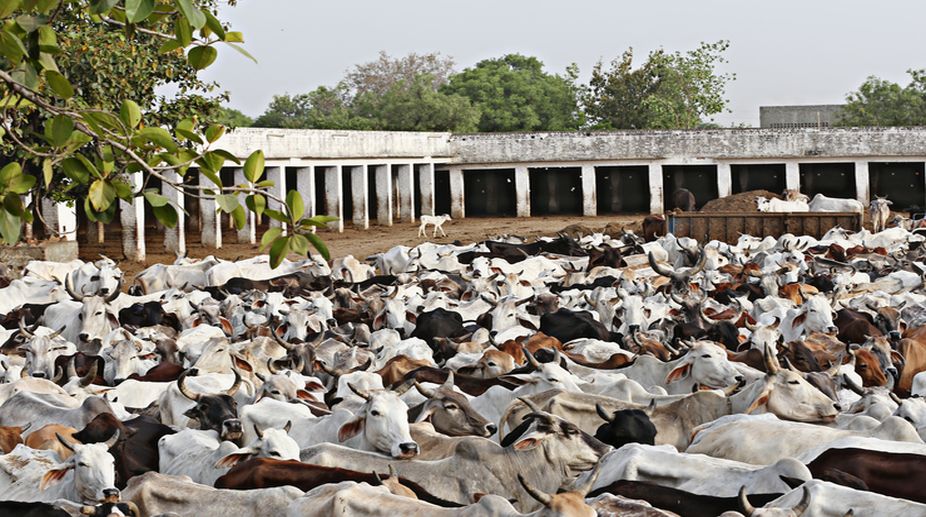Akhilesh Yadav accuses BJP of ruining lives of youth
The SP chief alleged that paper leaks were orchestrated as the government does not want to provide jobs to the youth.

Representational Image (GETTY IMAGES)
Cow politics has come to the fore once again. The latest provocation is the Centre’s move to ban sale and purchase of cattle in animal markets for slaughter. No doubt the cow population is declining and indigenous brands are dying slowly. And the BJP and the RSS have always talked of cow protection. It is also possible to make a case against mindless cow slaughter but has the Centre scored a self-goal by the ban on sale of cattle?
The latest controversy has legal, political, Constitutional, religious and social angles raising some pertinent questions. Besides it is also feared that the new rules may affect employment in meat, leather and dependent industries besides affecting the prices of poultry and even unproductive cattle. The BJP argues that the new rules do not ban cattle slaughter at all and they emanate from a Supreme Court directive to prevent cow smuggling across the border and are aimed at regulating livestock markets.
First let us take the Constitutional angle. The opposition notes that the Constitution provides for freedom of individual rights and it is not for the government to stipulate whether one should be a vegetarian or non-vegetarian. As for the federal angle, Kerala, Tripura, Meghalaya and other beef-eating states question the right of the Centre to impose the ban as it impinges on the rights of states guaranteed by the Constitution. Kerala chief minister Pinarayi Vijayan is planning to convene a meeting of chief ministers to thrash out this federal angle calling it an “anti-federal, anti-democratic and anti-secular move" and an attempt to usurp power from state governments. West Bengal Chief Minister Mamata Banerjee claims that it was a "deliberate attempt to encroach upon the powers of the states” and declared, “we won’t accept the Centre’s decision. It is unconstitutional.” In Kerala, West Bengal and most of the North-eastern region where cattle slaughter is legal, beef is widely consumed.
Advertisement
As for the legal part, citing the Vedas, a single judge bench of Rajasthan High Court last week recommended that the cow should be declared the national animal and the sentence for cow slaughter should be increased to life. The Kerala High Court has held that the Centre’s order does not ban cattle slaughter. The Madras High court has stayed the order asking the State and the Central government to respond within four weeks. The Supreme Court might take the final view later.
Politically, the opposition has got an issue to criticise the Modi government and it has given it an opportunity to unite. The BJP risks losing allies in the North-east where it is trying to expand. NDA allies like Naga Peoples' Front and National People’s Party have reservations about the ban as beef is eaten in the region. Ironically the BJP has been promising in local bye-elections to provide cheaper and quality beef.
What is worrying is how the fringe groups have become active resorting to vandalism. In Chennai an IIT student was beaten up for his participation in a beef festival last week and the students of Madras University are agitating for their right to eat what they want. In Maharashtra too the farmers are agitating. Though Prime Minister Modi has criticised the Gau Rakshaks for their vigilantism, the BJP- ruled state governments are not acting strongly against these private law enforcing forces.
Socially, it might alienate the Muslims and Dalits who depend upon the leather industry. Not only Muslims and Christians, but also India's Scheduled Tribes and Scheduled Castes – who account for 25 per cent of the country's population – are beef eaters though poultry is the meat of choice. While the BJP is strong in the cow belt, non-vegetarianism is prevalent in many non-BJP ruled states. In the Northeast and the South where the BJP plans to expand, the support for this measure is feeble, even non-existent.
On the econmic side, the cow economy is important from the birth of the cow to its death. People drink cow’s milk, use cow dung as manure, cow urine is used in some Ayurveda medicines, cow leather is used by the leather industry and beef of course is food for some. The ban will hit the meat and leather industries as well as beef export. Ironically, beef export has grown as according to data released by Foreign Agricultural Services/US Department of Agriculture, India along with Brazil remained top global exporters of beef during the year 2016 as they were in 2015.
Cow vigilantism and the consequent vandalism in some states are worrying and the vandals need to be checked. This is not to say that the case of the cow needs to be dumped. But it must be built on larger economic, ethical and environmental grounds. There are ways to woo Hindus. No one’s interests, more so those of the BJP will be served by this measure. It is a good sign that the Centre is planning to have a re-look at the ban and has fielded top ministers to explain. There are many Hindu causes that are legitimate, which BJP governments at the Centre and states can pursue without damaging livelihood interests.
Advertisement